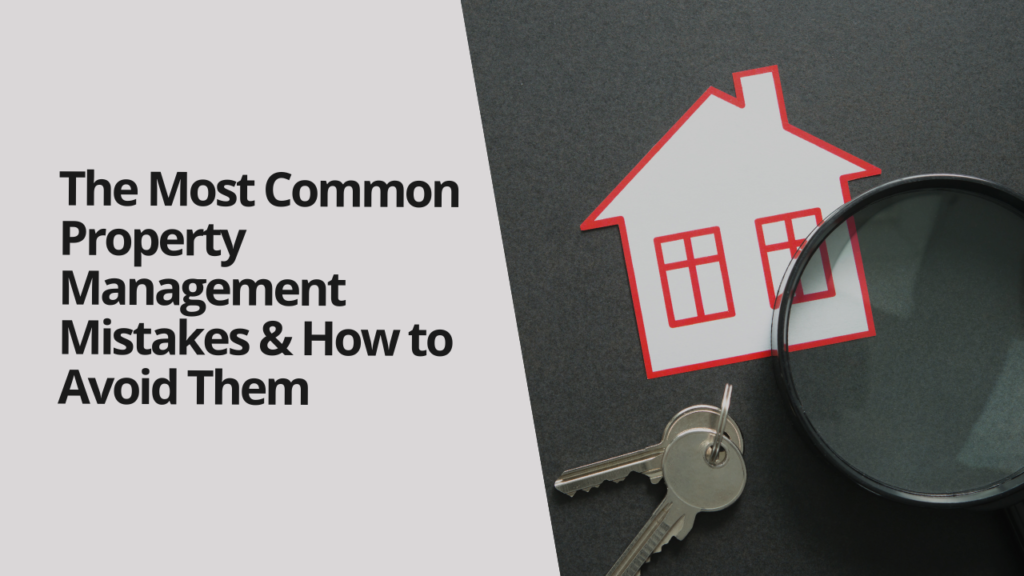Managing a property can be both rewarding and challenging. For landlords and property managers, balancing responsibilities requires a careful approach to avoid costly errors. Below, we delve into the most common property management mistakes and offer practical solutions to avoid them.
1. Neglecting Tenant Screening
Failing to properly screen tenants is one of the most frequent and costly errors in property management. Accepting tenants without verifying their financial stability, rental history, or background can lead to late payments, property damage, and legal disputes.
How to Avoid It:
Establish a thorough tenant screening process. Check credit scores, request proof of income, and contact previous landlords for references. Using professional tenant screening services can streamline this process.
2. Underestimating Maintenance Costs
Many landlords underestimate the costs associated with regular maintenance and repairs. Neglecting small issues like plumbing leaks or roof repairs can lead to major expenses in the long run.
How to Avoid It:
Budget for routine maintenance by setting aside a portion of the rental income. Regular property inspections can help identify and address minor issues before they escalate. Consider hiring a professional property manager to oversee maintenance schedules.
3. Failing to Understand Local Laws
Property management is governed by various local, state, and national laws. Failing to adhere to legal requirements, such as tenant rights, eviction procedures, and safety regulations, can result in fines and lawsuits.
How to Avoid It:
Educate yourself about relevant property laws in your area. Consulting with a legal expert or property management professional can ensure compliance and reduce legal risks.
4. Poor Communication with Tenants
A lack of clear communication often leads to misunderstandings and tenant dissatisfaction. Ignoring tenant complaints or being unresponsive to queries can damage relationships and result in higher tenant turnover.
How to Avoid It:
Foster open and consistent communication. Use multiple channels, such as email, phone, and online portals, to stay connected. Respond to tenant concerns promptly to build trust and loyalty.
5. Setting Incorrect Rental Prices
Pricing a property too high or too low can have adverse effects. Overpriced properties deter potential tenants, while underpriced properties can result in financial losses.
How to Avoid It:
Conduct market research to understand local rental trends. Analyze comparable properties in your area to determine a competitive rental rate. Professional property management firms often provide accurate rental valuations to maximize returns.
6. Ignoring Market Trends
Real estate markets are dynamic, and failing to stay informed about market trends can lead to poor decision-making. This includes missing opportunities to adjust rents, enhance property appeal, or invest in upgrades.
How to Avoid It:
Regularly review market reports and industry news. Staying informed allows you to adapt to changing conditions, such as shifts in tenant preferences or rising demand for certain amenities.
7. Inadequate Documentation
Improper documentation of leases, agreements, or payment records can create disputes and confusion. Missing or incomplete records make it difficult to resolve issues with tenants.
How to Avoid It:
Maintain meticulous records of all tenant interactions, payments, and contracts. Use property management software to organize and store documents securely.
8. Not Having a Contingency Plan
Emergencies such as natural disasters, sudden vacancies, or legal disputes can disrupt operations. Failing to plan for unforeseen events can result in significant financial strain.
How to Avoid It:
Prepare a contingency plan for emergencies. This includes having adequate insurance, a reserve fund for unexpected expenses, and a strategy for managing sudden tenant turnovers.
9. Micromanaging or Overdelegating
Striking a balance between control and delegation is crucial. Micromanaging can lead to inefficiency, while overdelegating without oversight can result in poor management.
How to Avoid It:
Clearly define roles and responsibilities. Regularly monitor delegated tasks to ensure accountability while trusting your team or property manager to handle routine responsibilities.
10. Neglecting Property Upkeep
Outdated properties are less appealing to tenants and can lose value over time. Neglecting upgrades or failing to maintain curb appeal can result in longer vacancy periods.
How to Avoid It:
Invest in periodic property upgrades, such as modern appliances or fresh paint. Prioritize cleanliness and aesthetic appeal to attract quality tenants.
Conclusion
Property management is no easy feat, but avoiding these common mistakes can save time, money, and stress. By adopting a proactive approach, staying informed, and leveraging professional expertise when needed, landlords and property managers can maximize their property’s potential while maintaining positive tenant relationships.
